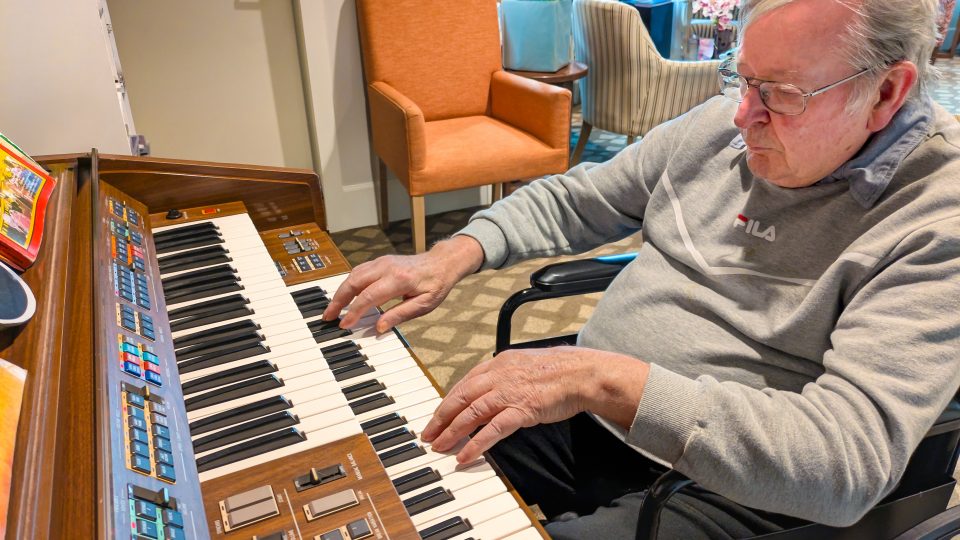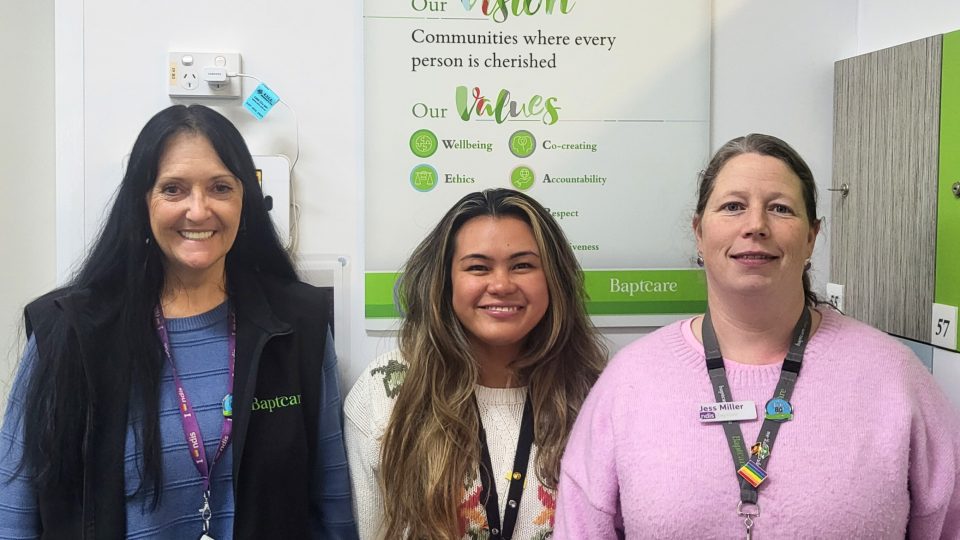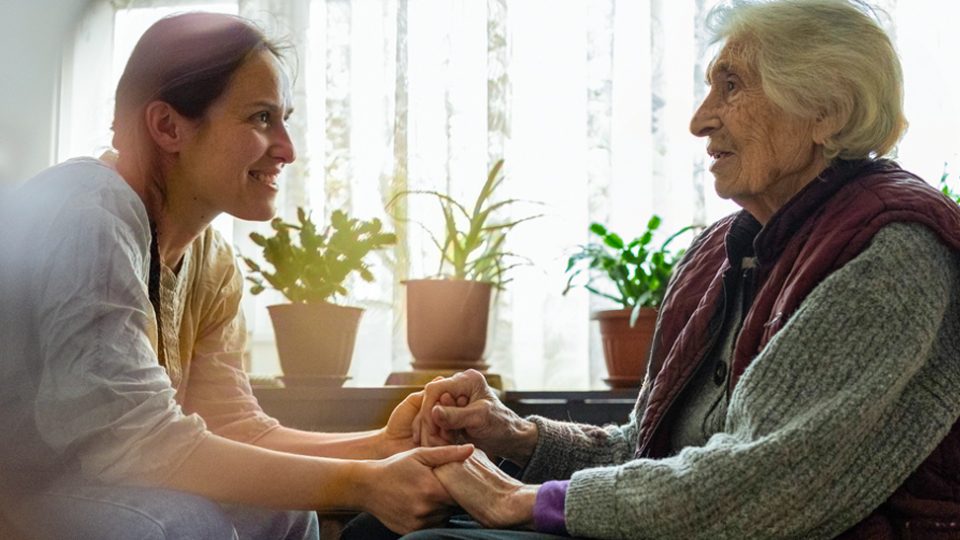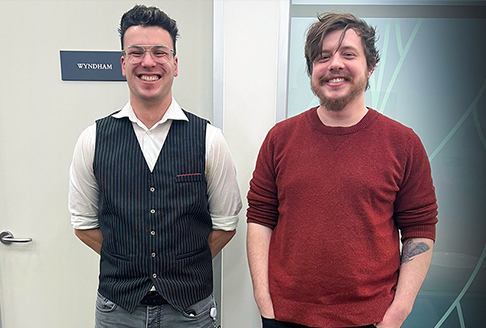What are your current roles?
Until recently when I moved to the Kinship Care area, James and I had worked together for nearly two years in the Targeted Care Package (TCP) space. TCP provides intensive case management for young people in out of home care who are at risk of entering residential care.
Can you please explain out of home care versus residential care?
Out of home care is a young person, 0-18 years old, living in a placement away from their biological parents. This could be a kinship placement with a family member such as a grandparent or aunt, for example.
Residential care is a young person living in a community home, being cared for by support staff. This residence is shared with other young people who are supported by services on a 24/7 basis.
How long have you been working at Baptcare?
Michael: September 2021
James: August 2022
Can you tell us more about the Targeted Care Package (TCP) space and what your jobs involve day by day?
The TCP is a smaller team in the Baptcare Victoria Family and Community Services (FACS) space and is quite a niche program in the Department of Families, Fairness and Housing (DFFH). We work closely with child protection to provide support to the young people and their family to ensure children are supported to stay at home. We sit on smaller case loads and visit the client once a week and the work is intensive.
A typical day at TCP entails engaging with clients, some of whom are at high risk. Thus, it’s common for us to proactively address their immediate safety concerns. We also adapt to various challenging situations, such as when a child reveals abuse or exhibits behaviours indicating potential risk. In such cases, we collaborate closely with their extensive care teams to orchestrate a suitable, effective and timely response.
TCP consistently keeps us alert, as each day brings unpredictable situations. However, the gratification stems from our close collaboration with clients, offering profound insight into their lives and requirements. We’re often commended for making seemingly impossible feats a reality.
What do you like about working with Baptcare and in the FACS space?
Michael: The cohesive and welcoming friendly culture at the Sunshine office truly sets it apart. It’s not just a great team and community, but an environment where everyone works together seamlessly. The Sunshine office embodies this spirit, making it a wonderful space to work in. And of course, the sweet biscuit tin adds an extra touch of warmth to our collaborative atmosphere.
James: I enjoy it when the snack bowl is stocked with Mentos. On a different topic, the office environment is fantastic. The team fosters a welcoming atmosphere, and there’s a sense of camaraderie among everyone. Lunchtimes are particularly enjoyable because you never know who you’ll end up chatting with, but you can always count on it being an interesting conversation.
It’s World Social Work Day – what is one thing you’d both like to change in society if you had a magic wand?
Michael: I would make V/Line trains actually run on time. In terms of social work, I would like unlimited funding and a much-needed update for the DFFH CRIS and CRISSP*.
*Ed. the CRIS (Client Relationship Information System) and CRISSP (Client Relationship Information System for Service Providers) are the client information and case management systems designed to improve services and facilitate the provision of coordinated care of DFFH clients.
James: This is a tricky one as I would probably want spiders to be the size of cats but less deadly so we could keep them as pets, especially jumping spiders, but I suspect most people would disagree with this. So, I would probably like to change society’s attitudes to mental health issues and make it socially acceptable for people to talk about and seek help for themselves.
Can you share a particularly special work day/customer interaction you’ve had recently?
Michael: for me it was not long ago when a client I had worked with for maybe two years ago turned 18. We closed with the family. To see all the growth and how far he had come in a short time was heartwarming. The placement was close to breaking down when I came on board. When the time came to an end, he was closer with his grandmother and had a plan to enter a mechanical apprenticeship all lined up for next term. It was hard to say goodbye to him and his carer but I knew he was on the right track.
James: this is a random one but through a strange series of events I ended up meeting a past client and we caught up. It was so nice to see what an accomplished adult she had become.
Can we just ask what you mean when you say “we closed with the family”?
Young people are no longer under child protection care when they reach 18 years of age. Unfortunately, that means we can no longer provide services to our clients. So, when we close a case with a client it means we stop working with them and follow the “closing process”. This usually involves doing all we can to ensure they are set up for the best possible future without us. This could mean setting up Better Futures (a less intensive case management service for people aged over 18 years) or any other relevant supports and finalising our service with the family.
Did you always want to work within the Family and Community Services (FACS) space? If not, what drew you to your line of work – and what are some other jobs you’ve performed in your career?
Michael: Honestly, I had no idea this line of work existed when I left university. I went into my Bachelor degree in Health Sciences with no idea where I was going to end up. I fell into youth work and wanted to continue to grow in the field. I got a job in workers compensation case management after youth work and realised I needed to go back to working with youth. IT WAS NOT FOR ME! TCP Baptcare saved me when they accepted my application. I also worked as a waiter and at McDonalds through university. Hospitality is way more stressful than you think! Its way more stressful than family services.
James: Similar to Michael, I didn’t know this area really existed, but I knew I wanted to work with teens; they are such a strange and interesting demographic to work with. On one hand they can be incredibly challenging but on the other, they can surprise you with just how much they are capable of with the right amount of support. But to be honest, I have mostly worked in administrative roles prior to this industry, and as anyone who has met me in person would agree, that is not my strong suit.
What did you want to be when you grew up?
Michael: A dinosaur (still do) Velociraptor or Allosaurus. Yes, T-Rex was bigger but we all know who had the brains behind the operations.
James: An Astronomer because I’ve always been interested in space and I always had the mathematics background. It was a last-minute gut instinct that made me switch my preferences to a psychology degree.
Can you tell us two surprising things about yourself?
Michael:
- I can make 2-minute noodles in 1 minute and 52 seconds.
- During Covid, I attempted watch repair and blacksmithing. I was not successful.
James:
- Surprisingly, I do not have a black belt in: Karate, Jujitsu, Tae Kwan do, Maui Tai, Ninjitsu, Aikedio, Krav Maga, Kick boxing and tennis.
- My top genre on Spotify is country music.
Please complete this question: my favourite weekend would include …
Michael: Time spent with my puppies, Noodle (Shetland Sheepdog) and Ducky (Corgi) and some time to go surfing.
James: Pottery classes (this is actually legitimate) and watching horror movies.
What are two things on your bucket list?
Michael:
- to learn the difference between “affect” and “effect.” I have googled this and still don’t quite comprehend the differences.
- See the northern lights.
James:
- Live with a Doberman (you don’t own them they are like roommates).
- Run my own art exhibition.
What is the last thing you watched and/or read?
Michael: The Wikipedia page on the Emu War. Did you know they’re going to make a musical about it!?
James: I am currently reading a horror novel, “Exquisite Corpse” by Poppy Z Brite and I’m re-watching “Avatar the Last Airbender” (the original not the remake).
Do you have a mentor or idol? OR, if you could sit next to someone at a dinner party, who would it be and why?
Michael: I would like to sit next to the two guys who made the TV series “Come Fly With Me” and beg them to make another season.
James: Probably the judges on “Drag Race” – I need fashion advice.
One last question relating to your working relationship.
You seem to have a great working relationship. What do you like most about each other – what are each other’s superpowers – and what do like about working together?
Michael: James is a very considerate worker. James is very selfless as a co-worker and is the first to support his team when things need to be done. James is very therapeutic in his works and goes above and beyond for his clients. James will form completely wild scenarios to attempt to solve obstacles when working with a TCP case that some people might say: this almost borders on crazy conspiracy theories.
His superpower is knowing completely useless information in depth.
What I liked most about working with James was he could lift the team’s spirits no matter what circumstances.
He will playfully disagree with someone’s point of view on purpose just to create debate. For example, if you said you liked pineapple on pizza, James would argue that pineapple on pizza is the worst, even though he enjoys pineapple on pizza, just so he can stir up the other person. This is quite enjoyable to watch as an outsider.
Since I’ve changed roles within Baptcare FACS, James hasn’t been the same without me.
James: Michael is probably one of the best co-workers I have ever had. It helps that he knows everything possible about the role but his biggest strength is that he is always willing to share that knowledge no matter how many times I ask him how to find the same document.
Michael is also excellent with all his clients. I won’t say who, but two of his clients recently started crying when they found out he was moving to a new role, at least I hope this was the reason and not that they realised that they would now just be stuck with me.
Michael’s superpower would be the ability to run twice as fast as a V/Line train so that he would have more time for his dogs at home.
The best part about working with Michael was feeling as though you always had someone on your side who you could trust to point you in the right direction when you need it, even if he does sometimes have to talk me down for some of my more outlandish theories.
On a personal level, what I really like most about Michael is how you can have really intelligent discussions about pretty much anything and he will hear you out and give you a genuinely good conversation, even if the topic is something insane, (like how big an animal do you think you could take in a one on one fight?).
As Michael said, he has changed roles and it hasn’t been the same but he’s still a joy to see in the office.
Community news
-

Wyndham Lodge Choir
Every Tuesday afternoon, residents gather in the sunny music room at Baptcare’s Wyndham Lodge Residential Aged Care community to sing together.
- 25 Jun 2025
-

The Green Team at Moonah Hub
The Sustainability Team, known as ‘The Green Team’, are based at Baptcare Moonah Hub in Hobart and are all about promoting environmentally friendly and sustainable practices in their office, the wider organisation and the local community. We asked Jess Miller, their enthusiastic and determined leader, all about the team and what they do. Read more below!
- 11 Jun 2025
-

Tips for addressing depression in older adults
Our post-retirement ‘golden years’ are often portrayed as a time of relaxation and enjoyment with plenty of time on our hands to enjoy the things we love. However, for many older adults this period can be overshadowed by struggles with depression.
- 05 Jun 2025

